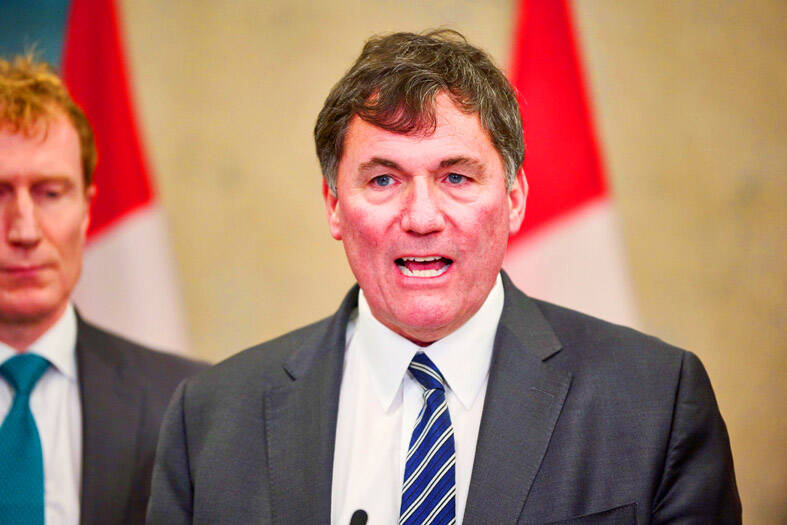Four Canadian ministers on Tuesday unveiled a border security plan they had privately presented to US president-elect Donald Trump’s incoming administration, with an emphasis on surveillance, intelligence and technology.
Canadian ministers had an “encouraging” meeting with Trump’s border czar, Tom Homan, Canadian Minister of Finance, Public Safety, Democratic Institutions and Intergovernmental Affairs Dominic LeBlanc told reporters.
“I went through with Mr Homan the information that we’re sharing with you today... I’m encouraged by that conversation and by conversations I’ve had with the incoming [US] secretary of commerce, Howard Lutnick,” LeBlanc said.

Photo: Bloomberg
LeBlanc and his colleagues announced a plan to beef up the US-Canada border with helicopters, drones, surveillance towers and sniffer dogs, as well as a “joint strike force” to target transnational organized crime.
The embattled minority government of Canadian Prime Minister Justin Trudeau said it would invest C$1.3 billion (US$908 million) toward border security over six years.
The plan focuses on fentanyl, irregular migration and organized crime.
Canada has been under pressure to beef up its border with the US since Trump threatened Canada and Mexico with sweeping 25 percent tariffs if they did not stem the movement of migrants and drugs into the US.
US authorities apprehended more than 23,000 people near the US-Canada border in the 12 months ending in October, more than double the previous 12-month period, but a tiny fraction of the 1.5 million people apprehended near the US-Mexico border during that time.
Canadian police said they have installed more cameras and sensors over the most-traversed section of the border over the past four years.
However, they acknowledge there is little they can do to stop southbound crossers.
Experts said the flurry of attention to the US-Canada border is as much about perception as reality.
A more effective mode of interdiction might be to stop people from coming to Canada in the first place, they said.
Canada is already attempting that — granting fewer visas and turning away visa-holders.
Canada also plans to amend its immigration law to allow authorities to “cancel, suspend, or vary immigration documents for reasons deemed in the public interest.”
Trudeau’s government was thrown into chaos on Monday when his finance minister and deputy prime minister Chrystia Freeland quit. Trudeau, trailing in polls, faces calls from within his own caucus to resign.

LONG FLIGHT: The jets would be flown by US pilots, with Taiwanese copilots in the two-seat F-16D variant to help familiarize them with the aircraft, the source said The US is expected to fly 10 Lockheed Martin F-16C/D Block 70/72 jets to Taiwan over the coming months to fulfill a long-awaited order of 66 aircraft, a defense official said yesterday. Word that the first batch of the jets would be delivered soon was welcome news to Taiwan, which has become concerned about delays in the delivery of US arms amid rising military tensions with China. Speaking on condition of anonymity, the official said the initial tranche of the nation’s F-16s are rolling off assembly lines in the US and would be flown under their own power to Taiwan by way

CHIP WAR: The new restrictions are expected to cut off China’s access to Taiwan’s technologies, materials and equipment essential to building AI semiconductors Taiwan has blacklisted Huawei Technologies Co (華為) and Semiconductor Manufacturing International Corp (SMIC, 中芯), dealing another major blow to the two companies spearheading China’s efforts to develop cutting-edge artificial intelligence (AI) chip technologies. The Ministry of Economic Affairs’ International Trade Administration has included Huawei, SMIC and several of their subsidiaries in an update of its so-called strategic high-tech commodities entity list, the latest version on its Web site showed on Saturday. It did not publicly announce the change. Other entities on the list include organizations such as the Taliban and al-Qaeda, as well as companies in China, Iran and elsewhere. Local companies need

CRITICISM: It is generally accepted that the Straits Forum is a CCP ‘united front’ platform, and anyone attending should maintain Taiwan’s dignity, the council said The Mainland Affairs Council (MAC) yesterday said it deeply regrets that former president Ma Ying-jeou (馬英九) echoed the Chinese Communist Party’s (CCP) “one China” principle and “united front” tactics by telling the Straits Forum that Taiwanese yearn for both sides of the Taiwan Strait to move toward “peace” and “integration.” The 17th annual Straits Forum yesterday opened in Xiamen, China, and while the Chinese Nationalist Party’s (KMT) local government heads were absent for the first time in 17 years, Ma attended the forum as “former KMT chairperson” and met with Chinese People’s Political Consultative Conference Chairman Wang Huning (王滬寧). Wang

OBJECTS AT SEA: Satellites with synthetic-aperture radar could aid in the detection of small Chinese boats attempting to illegally enter Taiwan, the space agency head said Taiwan aims to send the nation’s first low Earth orbit (LEO) satellite into space in 2027, while the first Formosat-8 and Formosat-9 spacecraft are to be launched in October and 2028 respectively, the National Science and Technology Council said yesterday. The council laid out its space development plan in a report reviewed by members of the legislature’s Education and Culture Committee. Six LEO satellites would be produced in the initial phase, with the first one, the B5G-1A, scheduled to be launched in 2027, the council said in the report. Regarding the second satellite, the B5G-1B, the government plans to work with private contractors